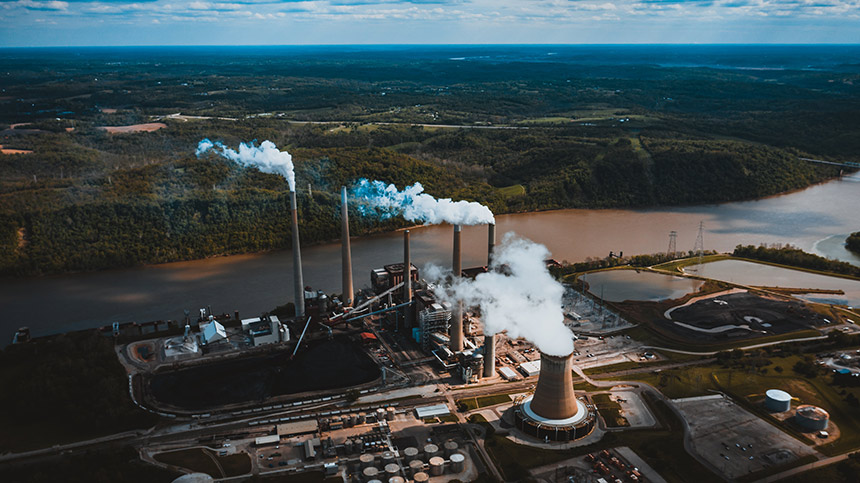
By Gwyneth K. Shaw
In late June, the U.S. Supreme Court handed down a decision advocates for action on global climate change had been dreading. With a 6-3 decision in the West Virginia v. EPA case, the court ruled the Environmental Protection Agency didn’t have the power under the Clean Air Act to try and regulate existing power plants — particularly coal-fired facilities — by forcing states to set limits for carbon emissions across its entire electrical grid.
Issued in 2009 by the Obama administration, the regulation in question was repealed under President Trump and the U.S. Court of Appeals for the D.C. Circuit had sent it back to the EPA for revision. But several state attorneys general and a coalition of power companies convinced the Supreme Court to take on its biggest climate change case since 2007, when a far different lineup of justices ruled the EPA had the power to regulate greenhouse gas emissions.
The latest decision raises numerous questions about the future of federal efforts to fight climate change — and may affect a broader swath of the administrative state if the court uses the same reasoning in other cases. Berkeley Law’s Center for Law, Energy & the Environment (CLEE), a longtime leader in the field, brought together three experts for a recent webinar to discuss the implications of the ruling for climate policy.
‘Some middle ground’
Professor Daniel Farber, CLEE’s faculty director, said the majority opinion written by Chief Justice John Roberts made the EPA’s regulation sound far more radical than it was. But while the decision is a blow to the fight to curb climate change, it’s not a fatal one, he said.
“Clearly, the EPA can’t do anything like the Clean Power Plan again. But the court didn’t quite adopt Trump’s ultra-narrow view of the EPA’s power either,” Farber said. “So there seems to be some middle ground, although it’s not clear how big it is.”
The ruling doesn’t stop the EPA from pushing individual power plants to reduce their emissions. That opens the door for the agency to require coal-fired plants to add other fuels to the mix, such as natural gas or biomass. That would also cut carbon emissions, although to a lesser degree.
“The way I look at it, and the way I hope the majority sees it, is that the court’s message to agencies was ‘stay in your lane,’ not ‘put on the brakes,’” Farber said.
Professor Sharon Jacobs, who recently joined the Berkeley Law faculty, said it was disappointing the court didn’t dismiss the question as moot, since the Obama-era rule never actually went into effect. But the majority opinion also doesn’t threaten the Supreme Court’s 2007 landmark decision in Massachusetts v. EPA, which found that the EPA has authority to regulate greenhouse gasses under the Clean Air Act.
The regulation at hand is important, Jacobs said, because existing power plants produce so much pollution: While their emissions are down about 20% since 1990, they still emit about a quarter of the greenhouse gasses in the U.S.
The original Clean Air Act, enacted in 1970, essentially assumed power plants that existed then wouldn’t be an issue for more than about 30 years. Power companies have successfully extended the lives of many coal-fired plants. Even so, Jacobs noted, about half of them are expected to go offline by the end of the decade.
Coal-powered plants are also struggling to compete with other fuel, including natural gas and renewable sources such as wind and solar.
“For coal plants, the writing is on the wall: They’re on the way out,” Jacobs said. “And that’s because of the economics, not because of anything the EPA is doing.”
A ‘major’ doctrine?
Another potential implication of the ruling is the majority’s reliance on the so-called “major questions doctrine,” which asserts that some policies are simply too important for agencies to address without explicit instructions from Congress. While analysts, other courts, and even some of the justices have used the term for years, Roberts is the first to cite it in a majority Supreme Court opinion.
Farber, Jacobs, and moderator Ted Lamm, a senior research fellow for CLEE’s Climate Program, all discussed how the doctrine might be applied to other regulatory efforts.
“I obviously would have preferred an even narrower holding,” Farber said. “I don’t like the major questions doctrine. I hope that the opinion gives the major questions doctrine, and its application to the EPA in particular, a little more concreteness … Even if it’s a bad rule, I’d rather know what the rule is than have them just completely make things up as they go along.”
Jacobs said the new approach could make it more difficult to attempt other moves aimed at curbing carbon emissions, such as a possible effort by the Federal Energy Regulatory Commission to accommodate state-level carbon pricing in wholesale energy markets.
She and Farber agreed that the ruling drives home the need for states and Congress to get more involved in fighting climate change. California, which has strong laws already in place, will be more insulated than many other states, but collaboration between state and federal governments — as well as regional coalitions — is crucial, Jacobs said.
“This is not a time to press for big transformative moves, because of what this court will do to them,” she said. “It’s a time to get creative, unless and until we have big pieces of federal legislation that answer these questions one way or the other.
“The court is asking Congress to do its job, and so we need for that to happen. To the extent that the Supreme Court is skeptical of what agencies can achieve with the statutes that they have, we need new statutes.”